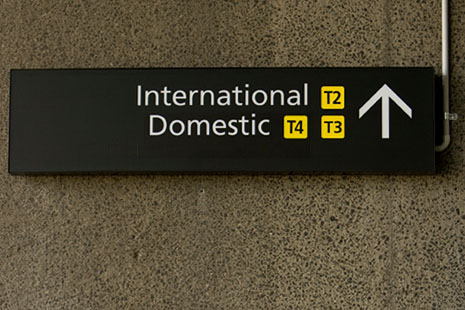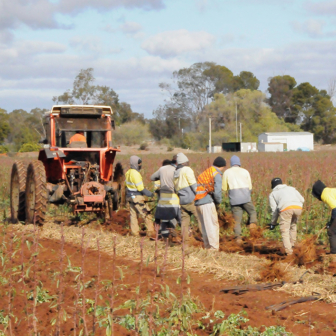IMMIGRATION Minister Chris Evans might soon have the power to force tens of thousands of international student graduates to leave Australia with just twenty-eight days’ notice. A bill quietly introduced into parliament late last month would give the minister sweeping powers to “terminate” applications for permanent residency, potentially enabling him to clear a massive backlog of applications from former students at the stroke of a pen. Tens of thousands of people seeking to come to Australia from overseas could also find their applications suddenly rendered null and void, despite the fact that they have invested thousands of dollars in the dream of moving to Australia and already waited years in a migration queue.
Although it hasn’t been reported elsewhere, news of the proposed amendment has spread rapidly through international student networks and online migration forums, sparking panic, outrage and consternation. On 26 May the bill was referred to the Senate Legal and Constitutional Affairs Committee, which received dozens of submissions from concerned applicants within a week of its inquiry’s commencing. Most were from foreign student graduates on bridging visas, and their passionate, if at times ungrammatical, pleas provide an insight into the level of anxiety the proposed reforms are generating.
One of them, a Sydney-based former cookery student, Jewel Mahmud, writes that she has “no words” to express the “misery” the changes could bring for her and other overseas students working hard “to survive in this expensive city.” International students are allowed to work twenty hours per week, but she says that she arrived in Australia four years ago to find her options were limited. “So i started with toilet wash then car wash then dish wash. I couldnt sleep for years. I was neglected and verbally abused almost every single day of my work life.” Ms Mahmud says her ambition is to become a chef and maybe open her own restaurant but she fears the visa-capping bill will dash her hopes and lay waste the time, energy and money she has invested in her studies: “I have no idea why such a wellfare country doing this to me but i know it sure will destroy my life and thousands of others.”
The Migration Amendment (Visa Capping) Bill 2010 would enable the minister to cap the number of visas issued in a given year to applicants with “specified characteristics.” The minister might, for example, choose to cap the number of visas granted to “hairdressers” or “cooks.” Once the designated annual cap is reached – and the cap could conceivably be set at zero – all outstanding visa applications with the same characteristics will be terminated. In effect, those applications will be treated as if they had never been made. The government will refund the pre-paid visa application charge but applicants will still be out of pocket for associated costs, including the fees paid for migration advice, health checks, language tests, skills assessment and recognition of qualifications.
Unlike a visa refusal, a visa termination cannot be challenged before the Migration Review Tribunal or any court – simply because, technically, the minister will not have made any decision, and without a decision there is nothing to review or contest. Capping and terminating will also impose an effective freeze on further visa applications by migrants who share the same “specified characteristics,” at least until the commencement of a new financial year.
Introducing the bill in the House of Representatives, the parliamentary secretary for multicultural affairs, Laurie Ferguson, said it would give the minister “greater power to effectively manage the migration program” by dealing with the large number of “valid applications” for skilled migration made by people “nominating occupations that are not in demand.” He said that the general skilled migration program is “dominated” by applications from “a limited number of occupations,” making it “difficult for the program to deliver the broad range of skills needed in the Australian labour market and the Australian economy.”
Mr Ferguson singled out cooks and hairdressers for particular attention, noting that the department has 17,594 valid applications from applicants with these skills on its books. These are among the 147,000 applicants for general skilled migration already waiting on a visa decision. Given that there are only 61,500 places set aside for general skilled migration in the next budget year, this backlog represents a prospective supply of more than two years’ worth of migrants for that migration stream. (Another 44,150 places are reserved for migrants nominated by employers.)
More than a quarter of the migrants waiting in the general skilled pipeline – 38,990 applicants as of 31 March – are former international students who have graduated from Australian universities and colleges. Many have already been waiting in the queue for more than two years; most are living in Australia on bridging visas, which allow them to work full time while their applications for permanent residency are pending. But if the minister were to cap and terminate their applications for permanent residency then the associated bridging visas would also “cease to be in effect” after 28 days. In practice this means that former foreign students would have four weeks to wind up their affairs and leave Australia.
Jewel Mahmud is only one of the former students to express great concern about the legislation. A Chinese man (name withheld) writes that he and his wife feel “cheated and disappointed” by the proposed changes. He says the visa-capping bill is “really unfair” since the changes will “affect existing applications that are already in the final stage of immigration.” Resident in Australia since 2006, the couple feel like their lives are on hold: “We have been supporting the Oz economy (tax, tuition, we also transferred 200k+ Australian dollar to Australia Commonwealth Bank. We plan to buy a house and really want to have baby, but it is just a dream without PR, we will be forced to sell house and leave within 28 days once our application ceased).” He writes that they are “shocked” by the proposed amendments and fear their visa applications “will be axed,” rendering all the money and time they have invested in Australia fruitless.
This writer also points out that because both he and his wife were born under China’s one-child policy, they are their respective parents’ “only kids.” Yet since lodging applications for permanent residency eighteen months ago they have been unable to return home to visit their parents for fear that their applications for permanent residency will be cancelled. Bridging visas granted to on-shore applicants for permanent residency do not allow them to travel outside Australia without “substantial reasons” such as death or serious illness of a close relative. If applicants leave Australia without explicit permission then their application for permanent residency will lapse.
Alison Reynolds wrote to the Senate committee about the situation of her husband, Mauricio Loconte, “a qualified and experienced mechanical engineer from Brazil.” After reading immigration department advice that Australian qualifications were preferred to overseas qualifications, Mauricio paid more than $20,000 to study in Australia. After he completing his course the couple applied for permanent residency and were “told to expect an outcome in 4–6 months.” Two years later they are still waiting.
“Mauricio has been in continuous employment as a motor mechanic,” writes Ms Reynolds. “He is in high demand, moves periodically to a slightly better position and currently works at Ford’s headquarters. His mechanical engineering degree was recognised by Engineers Australia and Ford increased his salary in recognition of this. We followed all the rules. Mauricio was, we believed, wanted by Australia for his skills and experience in a shortage area. We have been married 5 years and are waiting for an outcome so that we can start a family. However we both turned 35 this year, so time is running out. Led on by DIAC [Department of Immigration and Citizenship] literature, we have invested a considerable amount of time and money. Even now, the literature suggests motor mechanics are in demand.”
THE SENATE committee has very little time to consider the ramifications of the visa-capping bill. Submissions to its inquiry close this Friday, 4 June, and the committee is due to hand down its report just eleven days later, on the same day that the Senate resumes for the final seven sitting days of the winter session. While the Greens have some concerns about the bill, it seems unlikely that it will be blocked by the Coalition, which means it could pass into law before parliament is prorogued for a federal election.
Whether Senator Evans will use the new powers immediately to cap and terminate the permanent residency applications of certain groups of foreign graduates living in Australia on bridging visas is another question. There may be some elements in federal Labor Machiavellian enough to make a pre-election show of expelling unwanted cooks and hairdressers while reminding voters all the while that it was Howard-era policies that brought them to the country in the first place. Such a move might provide a welcome distraction from the continued arrival of asylum seekers by boat and give Labor an opportunity to boost its border control credentials on a different front.
But it could also have unforseen consequences. As another unnamed submission writer warns the Senate committee, a sudden move by government to cap visa applications and send home student graduates could create a new problem of “illegal immigrants” because the “majority of the applicants will not be returning to their country and will stay illegally in Australia.” Migration agent Mark Webster also predicts that a mass termination of onshore visa applications would result in the immigration department being swamped with desperate but dubious applications for refugee status or spousal visas as student graduates scramble to find other ways to extend their stay in Australia. No doubt there would be protests in Australia’s major cities too, as we saw in response to attacks on Indian students.
Mr Webster predicts that Senator Evans is more likely to exercise his new visa-capping powers to cull the number of overseas applications stuck in the migration processing queue. He will be able to do this by identifying and capping certain groups of “off-shore” applicants with specific skills. Once the annual cap is reached all other applications in the pipeline can be terminated. There will be understandable howls of protest from the migrants potentially affected – and perhaps even some diplomatic fallout from foreign governments – but it is easier to take harsh measures against people who are resident in another country than to target those who are resident in your own.
Under the Migration Act the minister already has the power to cap and cull entire visa classes or subclasses, but this is a very blunt instrument that affects all applicants indiscriminately. The proposed new measures would enable the minister to reach inside those visa classifications to identify, cap and terminate more narrowly defined groups. As Laurie Ferguson told parliament, the bill would enable the minister to restrict classes of applicants, rather than classes of visa.
The explanatory memorandum to the bill says the amendments are intended to address the “noticeable skew” in applications for general skilled migration towards certain occupations. But it also makes clear that the mechanism “could apply to all visa classes, subclasses or streams within a subclass,” providing government “with a tool for the targeted management of all aspects of the migration program... as the need arises.” Mark Webster suggests that the capping and terminating of visa applications could also be used in the family migration program, which suffered a cut of 5750 places in the May budget. A very large number of pending applications has built up within the family stream, especially for the limited number of parental visas granted each year, which enable adult children to bring parents to join them in Australia. Potentially, the government could also use the new provisions to limit the number of temporary visas granted in any given year to international students, working holiday-makers or temporary workers brought in by employers under the 457-visa scheme. These schemes are currently not subject to any overall cap or quota.
Protection visas are the only category specifically exempted from capping and culling in the proposed amendments, since such a cap would potentially put Australia in breach of its obligations under the refugee convention. But in all other respects the bill appears to present the minister with very broad powers. Laurie Ferguson told the House that the characteristics of visas that may be capped and terminated will be “objective” and cited such things as the occupation of the applicant or the date of the application. Yet there appears to be nothing in the bill that would prevent visas being capped and terminated on the basis of nationality – nothing to prevent the Australian government deciding to limit the number of visas granted in any one year to nationals of India or China, for example. This is not to suggest that this is the intention, but once the laws and powers are in place there is no telling what future ministers might do with them.
At one level the proposed Migration Act amendments can be seen as another step by the Rudd government towards cleaning up the cooks-and-hairdressers mess created when John Howard’s government linked study in Australia to permanent residency, fostering a boom in short-term vocational courses often designed to deliver residency rather than skills. At another level, the bill is the latest step in Senator Evans’s fundamental revamp of skilled migration, which he wants to shift from a “supply driven” to a “demand driven” program. Rather than a system in which skilled migrants independently put up their hands to apply to come to Australia, the minister is building a system that relies much more heavily on employers identifying, nominating and sponsoring the particular skilled migrants they need.
To this end, general skilled migration has been cut from about 75,000 places in 2007 to 61,500 places in 2011, while employer-nominated skilled migration has been sharply increased from 16,500 to more than 44,000 places over the same period. Other measures in this direction have been the introduction of new visa-processing priorities and the scrapping of the expansive Migration Occupations in Demand List and its replacement with the new, more carefully targeted Skilled Occupations List. Senator Evans’s hope is that collectively these measures will generate a migrant intake more in keeping with the long-term needs of the Australian economy, while allowing other skills gaps – particularly in trades – to be filled through the training of local workers. If the revamped system once again delivers too many applicants of a particular type then the proposed new visa-capping powers will enable the minister to intervene and set things right.
The minister’s aims are understandable, but the measures proposed in this new bill could cause considerable anguish and have unforseen consequences. It would be alarming indeed if the bill should open the way for a future immigration minister to cap and terminate visa applications because they were lodged by nationals of a particular country. It’s hard to avoid the conclusion that the amendments deserve more rigorous scrutiny than is possible in a three-week inquiry by the Senate Legal and Constitutional Affairs Committee – and more thoughtful public debate than is likely in the fevered lead-up to a federal election. •
After this story was published by Inside Story, Peter Mares spoke to Immigration Minister Senator Chris Evans on The National Interest on ABC Radio National about the issues involved. Senator Evans says that some of the reporting on the Migration Amendment (Visa Capping) Bill 2010 is “hysterical and inflammatory” and said that this article is adding to that hysteria. He said that he has made it very clear that transitional arrangements are in place to provide pathways for foreign students and foreign student graduates who are already in Australia to move towards permanent residency. He also said the powers created under the bill would be used “very, very rarely” where there was a need to manage the migration program to deal with a backlog of applicants for permanent residency who had no chance of success. He disputed the view that the new powers proposed in the bill would enable him or a future immigration minister to cap and terminate visas on the basis of nationality, saying this would “run foul” of discrimination laws and Australia’s international obligations. But he said that if the inquiry by the Senate Legal and Constitutional Affairs committee throws up issues that need to be addressed in the legislation then he will address them. The interview is available on The National Interest’s website.
A few days later the Senate Committee announced that it hopes to extend its reporting date to 11 August 2010 (a change that must be approved by the Senate before it can be formalised). This would mean a later closing date for submissions of 18 June.




